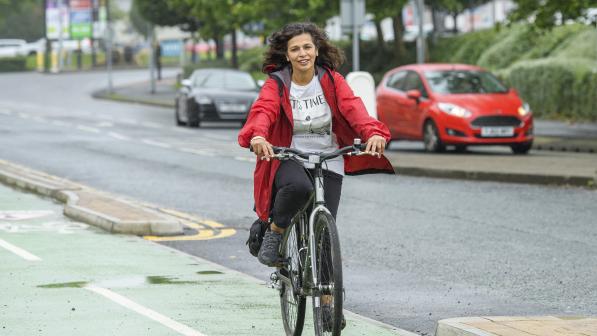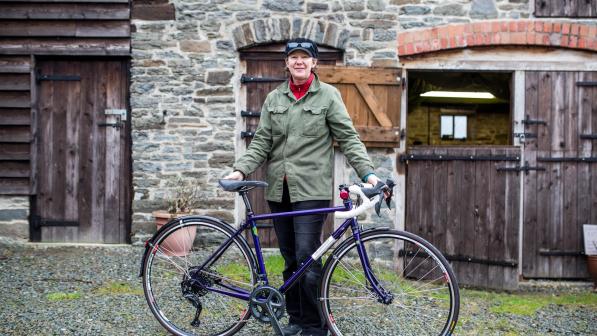Women’s safety and cycling after dark

“What do we want?” “Freedom to ride!”
“When do we want it?” “Now!” We shouted back enthusiastically.
“No! After dark!”
So began London Cycling Campaign’s (LCC) Freedom to Ride After Dark cycle through London’s night-time streets. The chant became something of a mantra as we rode through the dark on bikes ranging from hired Forest Bikes and e-cargo bikes to Bromptons and top-of the range road bikes.
More than 100 women and some men had gathered together at London’s Marble Arch on a cold February evening to highlight and protest that a significant proportion of London’s cycle network isn’t safe for women to ride after dark.
Safety was the message of the ride
It was a joyous occasion. Many riders had decorated their bikes and themselves with multi-coloured lights, tinsel and anything that sparkles. There was an e-cargo bike pumping out top ’80s anthems. But the ride had a serious message: safety.
The route went through unlit parks, little-used backstreets, dark underpasses and deserted commercial areas. All of which are part of Transport for London’s (TfL) official network of cycleways and cycle paths. During the day – and especially in summer – some of these routes would be lovely. But at night, and alone, they would be unsafe and intimidating.
One woman I spoke to said that in the dark she has to rethink all her usual routes. TfL will send her through parks and along unlit canal towpaths. It was an experience we could all relate to.
The ride was the result of a campaign by LCC aimed at getting more women to ride. Currently, women make up only about quarter of those who cycle. The main reason given for this is a perceived lack of safety, and unsafe infrastructure is a large part of this.
Socially unsafe cycleways
London has an incredible 353km of approved cycleways. However, to keep cyclists and drivers separate, many of these have stretches on back roads, through unlit parks, industrial estates or alongside canals with no escape routes. Stretches that LCC describe as ‘socially unsafe’.
In a mammoth task, LCC’s Women’s Network – of which I’m a member – mapped all of TfL’s cycleways, taking photos and video to identify which areas were unsafe after dark. It was found that 24% of the network is unsafe at night, more than half of all cycleways have unsafe sections and seven are unsafe after dark along their entirety. All this has been put in a report to TfL.
Women united in a common cause
It was some of these unsafe cycleways that last night’s route highlighted. There was a carnival atmosphere on the ride and it was wonderful to come together with so many women united in a common cause, many of whom I’d previously interacted with through the Women’s Network.
The 7.5-mile ride, which ended at Paddington Station, was brilliantly led by Mariam of JoyRiders and marshalled by LCC volunteers. Bemused drivers were held up as more than 100 of us crossed busy junctions, while people came out of their homes and restaurants to take photos. All other road users were incredibly patient which was a joy to see.
Safe infrastructure for all
Women’s safety while cycling is something that is important to us here at Cycling UK. We’re keen to address the imbalance between the number of men and women who cycle and we recognise that one of the best ways of doing this is good, safe infrastructure that works for everyone.
I was proud to have been a part of this ride and this brilliant initiative from LCC. I can’t help but wonder, though, if this is what things are like in London, where we do at least have a comprehensive cycleway network, what it’s like in other towns and cities – and especially in more rural areas.
Safer and better infrastructure that serves women is safer and better infrastructure for everyone. LCC is asking Mayor Sadiq Khan for a city-wide cycle network that is safe all day and all year round. I would like to see that across the whole of the UK.


